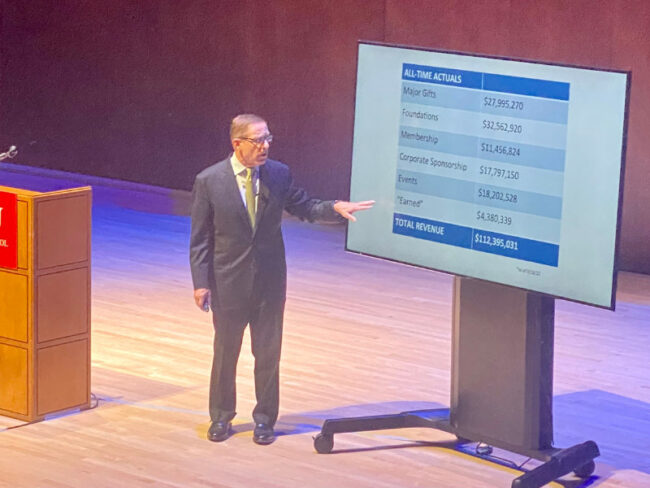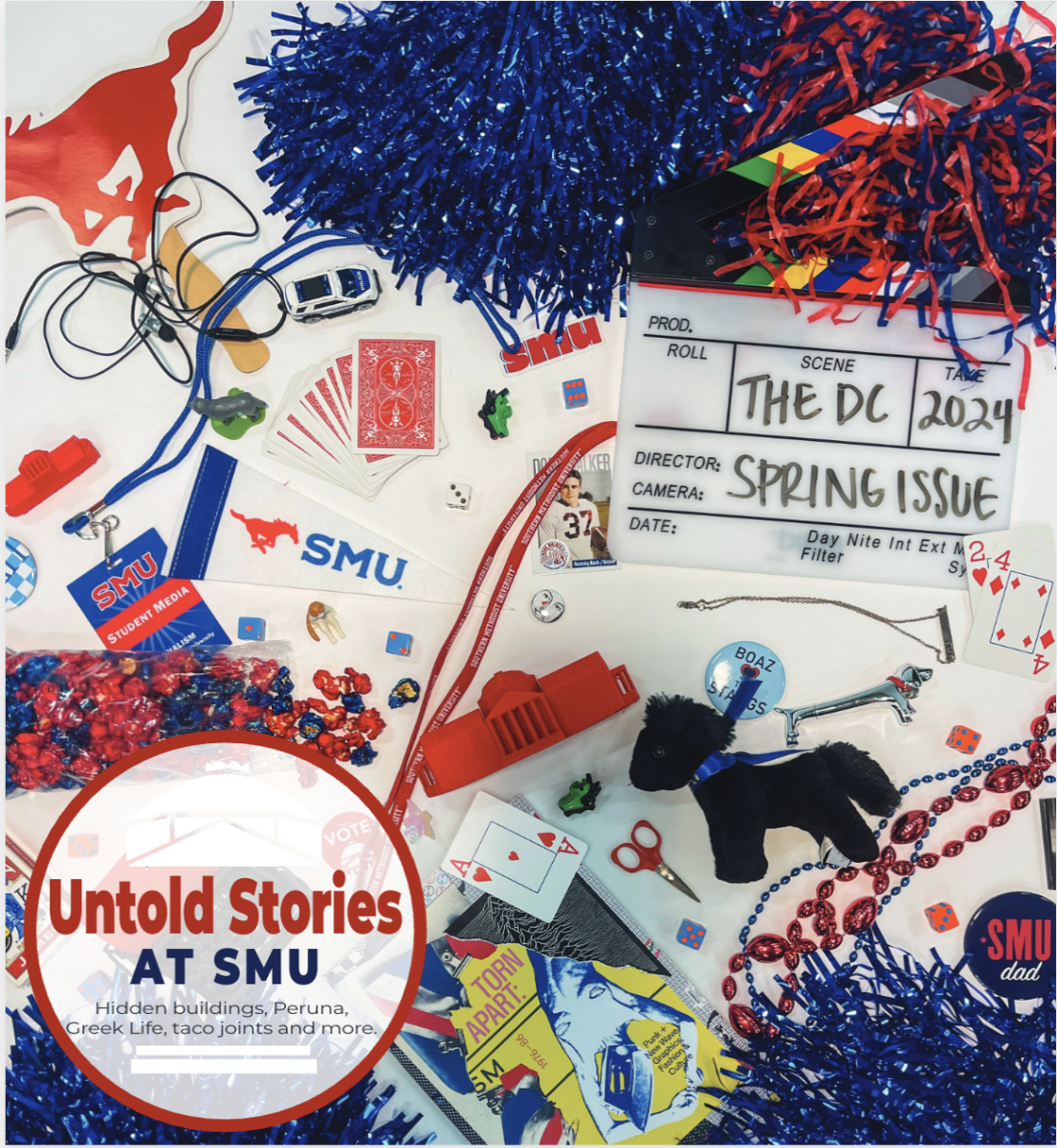Public service journalism is the key to preserving democracy, and it starts with fulfilling the responsibility to provide a consistent source of nonpartisan news and credible information, said Evan Smith, the CEO and co-founder of the Texas Tribune.
At the annual Sammons Lecture in Media Ethics on Oct. 5, Smith said there has never been a more important time for the journalism industry to step up and do its job than right now.
“Democracy is ending by the minute,” Smith said. “We could go a day or a week or a lifetime without encountering a point of view different from our own. We’ve stopped talking to and listening to people we disagree with. This is poisonous. Journalism in the public interest — reporting, not commentary — is the antidote.”
When Smith left his position as president and editor in chief at the Texas Monthly in 2009, he was worried journalism was going in the wrong direction. Local newspapers across the state were shutting down, news deserts were becoming more prominent and the number of reporters covering the state capitol had dwindled to nearly a third of what it had been when he first moved to Texas. Smith was concerned there were not enough places to find reliable, independent journalism. It was the catalyst for his decision to leave Texas Monthly and start the Texas Tribune.
He wanted the Texas Tribune to be a nonpartisan news source with a reliable business model.
“We needed a new way to think about fulfilling our responsibility and our obligation to provide a consistent, credible, independent source of nonpartisan news and information,” Smith said.
The implications of dwindling newspaper circulation and declining readership go beyond the sphere of journalism, affecting the civic engagement of the entire state. With 60% of 254 counties having only one or no local news outlets, some Texans don’t have access to credible information, leaving them susceptible to conspiracy theories or misinformation.
“Access to information is like water and power. It’s a utility, and we should not deny people access to those things,” Smith said. “I worry that democracy is at risk because too many people are lacking in basic information that would allow them to understand the stakes they have in the fights going on waged in their name, and in fact, would even be aware of the fact that there are fights and most people don’t.”
Instead of taking a local approach such as a newspaper or television stations, the Texas Tribune disseminates credible, nonpartisan information focused on state issues, policies and politics throughout Texas.
Smith attributed the Tribune’s success to a combination of the nonprofit business model, a clear and unwavering mission and reliable, award-winning reporting.
As a nonprofit, the Texas Tribune has a diverse revenue model that is supported by individual contributions and memberships, major gifts, corporate sponsorships, events and foundation grants. The multiple buckets of revenue approach ensures the news outlet is protected from downturns in any one source of revenue. The business model also maintains nonpartisanship by discouraging profit-based partiality, enabling journalists to focus solely on informing their audience.
“We are the biggest megaphone in the media in Texas, to tell the public that these issues matter,” Smith said. “When the public knows that these issues matter, the public tells people in elected office, ‘We need to fix this.’ And we can enable them by communicating to people through our nonpartisan journalism that public education, healthcare and life are important issues to be paid attention to.”
Consistent with its goal of raising the level of civic engagement in the state, the Texas Tribune provides all content free of charge to consume, republish and repost. Because it does not generate revenue from digital interactions, the content is only loyal to the readers rather than an advertiser or platform. Distributing free content fills the information gaps left by defunct local news outlets and helps diminish the flow of disinformation. Smith said if more people are reached by giving away content for free, it is all for the greater good of civic engagement.
“We can always make the right decisions journalistically, because for us it is only and entirely about impact,” he said. “At no time […] have we ever auctioned off the independence of our work to the highest bidder. That independence is all we have.The first time you compromise, it is the last chance you’ll have to.”
Content focused specifically on state politics, policies and issues combined with credible, reliable reporting allows the Texas Tribune to encourage civic engagement, hold officials accountable and, as Smith said, bring everyone in the state up to a basic level of being informed.
“One story at a time we’re giving people the tools to be more thoughtful and productive citizens, to know and comprehend what the government is doing for them and to them,” he said.
The concern for journalism and civic involvement that prompted the creation of the Texas Tribune is still one Smith said he has today. However, the successfully established business model does provide some hope for maintaining democracy.
Though Smith and his co-founders had never intended to create a sustainable and replicable framework for providing public service journalism, startups across the country are emulating the organization’s business model and content focus, describing themselves as the “Texas Tribune” of their own state.
“Of all the things we’ve accomplished over those 13 years, this is the one I’m most proud of,” Smith said. “We have catalyzed a movement and not a moment too soon.”
Smith provided his audience with a litany of ways in which democracy is currently under attack from a lack of trust between the public, federal institutions and the media to polarized school board meetings which he called “the new UFC cage matches.” These aspects, combined with a majority of the public that is dissatisfied with democracy, warrant ethical news organizations more than ever before, and the Texas Tribune’s model provides a strong foundation.
“We’ve inspired or motivated other news organizations to do the work that they should have been doing all along,” Smith said. “They began to see this work is important, and this work is possible. They might have gotten there on their own, but they also might not have.”
The obligation to preserve democracy is not only the responsibility of news organizations, however, but also journalists in general. Though Smith acknowledges the media did not cause the blur between fact and opinion, he does blame the media for enabling it by normalizing both sides of the divide and refusing to shut down misinformation.
“We give them space in our pages […] to allow them to lie without calling bullshit,” Smith said. “That’s pointless. Do not be kept. Do not be bullied. Like searching for the truth, calling bullshit is also a hard job.”
Though he is originally from New York, Smith said he is a self-proclaimed Texas convert who loves the state enough to both stay but to also be honest about the things that need to be better.
“The definition of a real Texan, somebody who truly loves this state, is someone who is clear-eyed about the state and understands that this is the most wonderful place in the world to be to grow up, to live, to raise a family,” Smith said. “And also, there are things about it that don’t work and aren’t working. We have to be honest about Texas, the good and the bad.”
Local, public service news outlets like the Texas Tribune embody this definition by celebrating Texas while also searching for the truth to keep the public informed.
“Thirteen years in, I believe in what we do more than I did on day one. I believe in the Texas Tribune, its embrace of its mission and the way my colleagues work towards that goal everyday.”
Smith announced in January that he would be stepping down as the chief executive of the Texas Tribune at the end of the year with plans to stay on as an advisor into 2023. Though he did not discuss the specifics of what comes next for him, Smith implied it would be in the public journalism space which he called “the most fulfilling work.”





















